QAnon Beliefs and Believers
The right-wing QAnon conspiracy movement emerged on the internet in late 2017. While followers of the QAnon movement claim a variety of different beliefs, the main threads of QAnon’s core theory are that a network of Satan-worshipping pedophiles control the government and media, and that a coming “storm” will sweep them out of power.[1] The QAnon movement centered former President Donald Trump as its key leader, and said he was secretly fighting to unmask the evildoers who controlled the political and economic systems of power.
Perhaps the most visible role QAnon has played was in the January 6, 2021, insurrection at the Capitol, from which the “QAnon shaman” became an iconic image. Fortunately, the goal of keeping Trump as president despite his electoral defeat was not achieved. Even through Trump leaving office, major social media platforms banning QAnon activity, and the leader of the movement, called “Q,” disappearing from the internet, QAnon has continued to thrive on alternative platforms with a handful of influencers leading the group.[2] PRRI data also shows that the proportion of Americans who believe, or are at least open to believing, QAnon conspiracies held mostly steady throughout 2021.
Measuring QAnon Beliefs
To attempt to understand both the scope and the makeup of the QAnon movement, PRRI fielded a set of three questions in four different surveys over the course of 2021, measuring agreement or disagreement (completely agree, mostly agree, mostly disagree, or completely disagree) with foundational QAnon beliefs:[3]
- The government, media, and financial worlds in the U.S. are controlled by a group of Satan-worshipping pedophiles who run a global child sex-trafficking operation.
- There is a storm coming soon that will sweep away the elites in power and restore the rightful leaders.
- Because things have gotten so far off track, true American patriots may have to resort to violence in order to save our country.
Combining data from these four surveys offers a comprehensive look at QAnon beliefs. Across the four surveys, around one in five Americans mostly or completely agree that there is a storm coming (22%), that violence might be necessary to save our country (18%), and that the government, media, and financial worlds are controlled by Satan-worshipping pedophiles (16%).
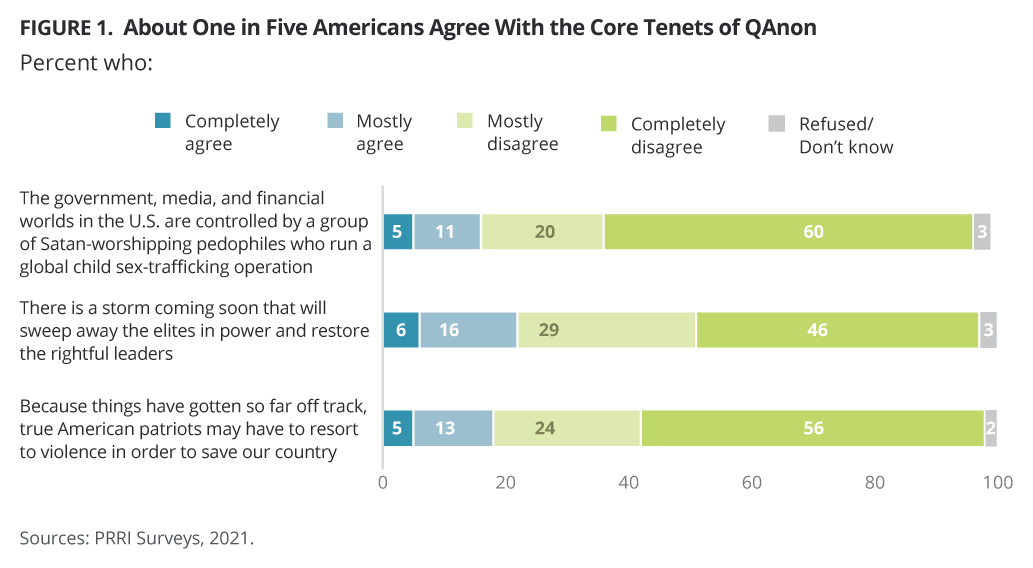
To assess overall belief in QAnon, PRRI created a composite measure from these three questions and identified the following three groups:
- QAnon believers: Respondents who completely or mostly agreed with these statements.
- QAnon doubters: Respondents who mostly disagreed with these statements.
- QAnon rejecters: Respondents who completely disagreed with all three statements.
Across 2021, 16% of Americans were QAnon believers, 48% were QAnon doubters, and 34% were rejecters. The share of QAnon believers has increased slightly through 2021. In March, 14% of Americans were QAnon believers, compared to 16% in July, 17% in September, and 17% in October. The share of QAnon doubters has remained relatively steady (46% in March, 49% in July, 48% in September, and 49% in October), while the share of QAnon rejecters has decreased slightly from 40% in March to 35% in July, 35% in September, and 34% in October.
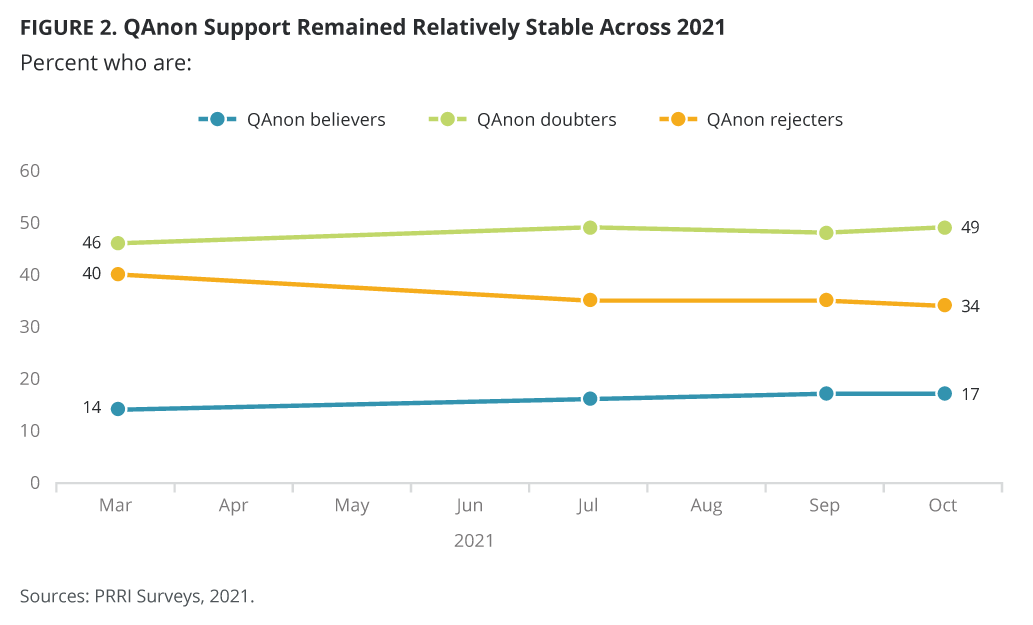
Across the year, one in four Republicans (25%), compared to 14% of independents (14%) and 9% of Democrats identify as QAnon believers. Nearly half of Republicans (47%) who most trust far-right news outlets like One America News Network or Newsmax are QAnon believers, along with one-quarter of Republicans who most trust Fox News (26%) or do not trust TV news (26%). Fewer (18%) of Republicans who most trust mainstream media outlets like CNN, MSNBC, public television, or broadcast news are QAnon believers.
Around one in four Hispanic Protestants (27%), white evangelical Protestants (23%), and Jehovah’s Witnesses (23%) are QAnon believers. One in five or fewer other Protestants of color (21%), Hispanic Catholics (18%), Black Protestants (17%), Latter-day Saints (17%), Buddhists (17%), other Catholics of color (15%), white Catholics (14%), or white mainline (non-evangelical) Protestants (14%) are QAnon believers. Small shares of religiously unaffiliated Americans (11%), Unitarian Universalists (7%) or Jewish Americans (5%) also fall into the QAnon believer category.
Demographics of QAnon Believers
Looking only at the 16% who are QAnon believers, 43% are Republicans and 27% are independents.[4] Smaller shares are Democrats and other political party affiliations (19% and 12%, respectively).
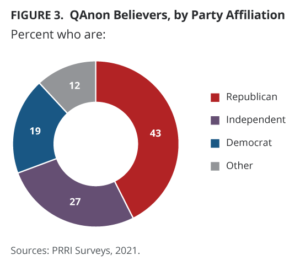
Religiously, about one in five QAnon believers identify as white evangelical Protestants (20%). Religiously unaffiliated Americans make up 17%, along with smaller shares of white mainline (non-evangelical) Protestants (12%), white Catholics (12%), Hispanic Catholics (10%), Black Protestants (8%), Hispanic Protestants (6%), other non-Christian religions (6%), other Christian denominations (3%), other Protestants of color (3%), and other Catholics of color (2%).
When looking at race and ethnicity, around six in ten believers (58%) are white Americans. Hispanic Americans account for around one in five (20%) and Black Americans for just over one in ten (13%) QAnon believers. Less than one in ten believers are of other races or ethnicities (6%) or multiracial (2%).
QAnon believers are significantly less likely than all Americans to have college degrees. Nearly nine in ten QAnon believers (86%) have less than a four-year college degree, while 14% have a four-year degree or a postgraduate degree. A solid majority of believers (57%) have a high school degree or less.
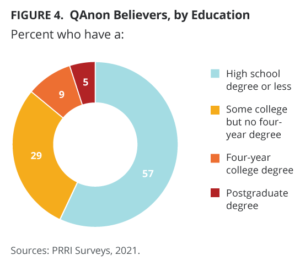
There are only minimal age differences between QAnon believers and the general population. One in five QAnon believers are between the ages of 18 and 29 (21%), 34% are ages 30 to 49, 25% are ages 50 to 64, and 20% are over age 65.
QAnon believers are most likely to have household incomes of less than $50,000 per year (48%), while about one-third have annual incomes of $50,000 to $100,000 (31%) and one in five have incomes above $100,000 per year (21%).
A plurality of QAnon believers (45%) live in suburban areas, while three in ten (31%) live in urban areas and 24% live in rural areas. QAnon believers are most likely to live in the South (44%), while about half as many live in the West (22%), the Midwest (20%), or the Northeast (14%).
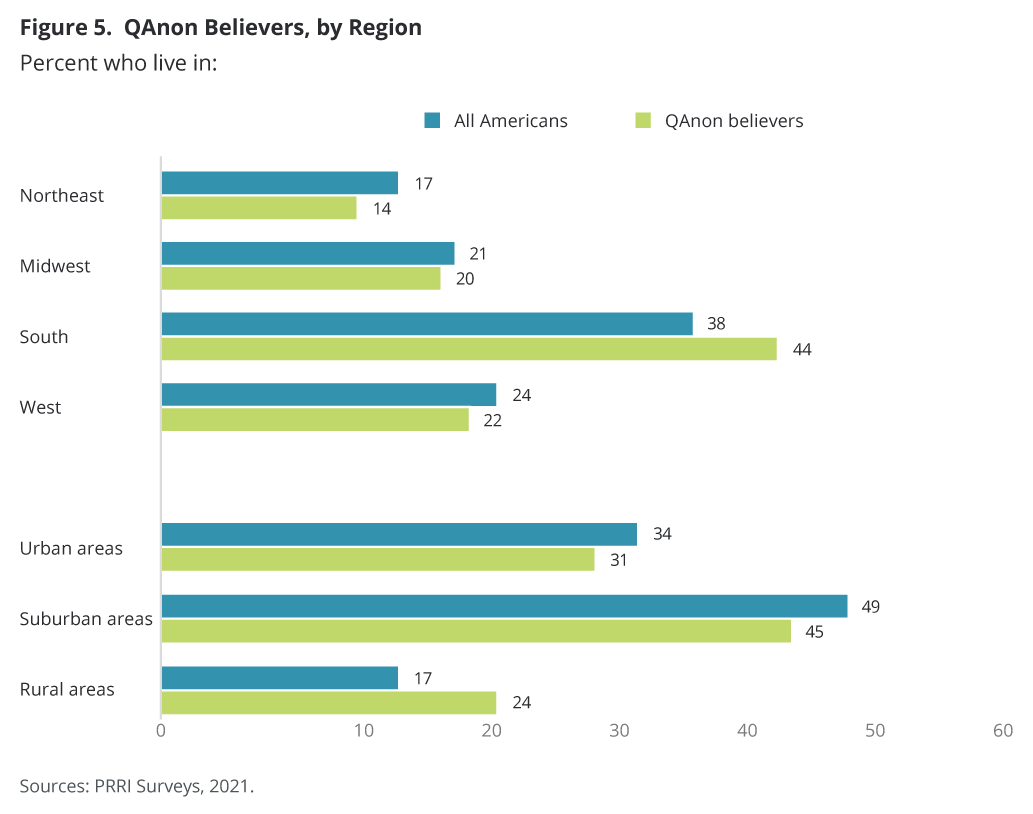
About one-third of QAnon believers say they most trust mainstream news (34%), compared to a majority of all Americans (53%).[5] QAnon believers are more likely than all Americans to say they most trust Fox News (19% vs. 11%, respectively) or far-right news outlets like One America News Network (OANN) and Newsmax (9% vs. 3%, respectively). QAnon believers are also somewhat more likely than all Americans to say they do not trust television news outlets (37% vs. 32%, respectively).
Explaining QAnon Believers
PRRI constructed a logistical regression model to explain which characteristics are associated with QAnon beliefs. In the table below, the dependent variable is the QAnon believer category from the QAnon scale. The independent variables are grouped into four categories: political orientation, media consumption, religious affiliation, and socioeconomic and demographic traits. Table 1 shows all statistically significant results where the magnitude of the odds ratios is greater than 1.5.
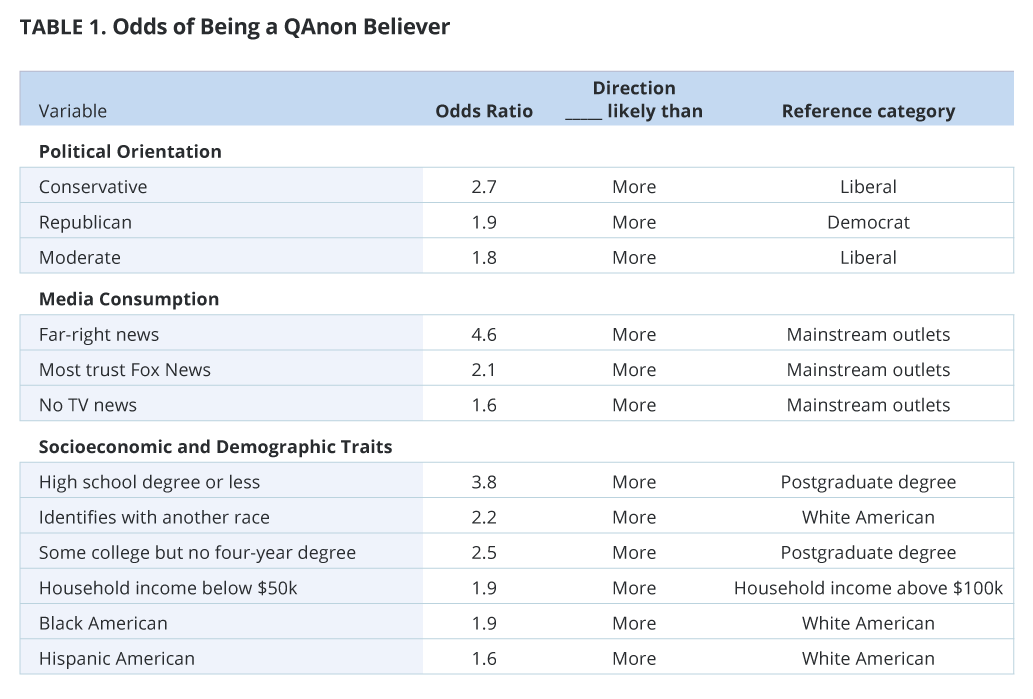
Even when controlling for partisanship and ideology, media consumption is the strongest independent predictor of being a QAnon believer. Americans who most trust far-right news outlets like One America News Network (OANN) and Newsmax are nearly five times more likely than those who most trust mainstream news to be QAnon believers. Also, Americans who most trust Fox News are about twice as likely as those who trust mainstream news to be QAnon believers.
Partisanship and ideology are also major factors in predicting QAnon beliefs. Americans who identify as conservative are nearly three times as likely as those who identify as liberal to be QAnon believers. Moderates are almost twice as likely as liberals to be QAnon believers. Republicans are about two times more likely than Democrats to be QAnon believers.
The regression analysis also shows that Americans with greater levels of higher education are less likely to be QAnon believers. Compared to Americans with postgraduate degrees, Americans with a high school degree or less are nearly four times more likely to be QAnon believers, those with some college experience but no four-year degree are two and a half times more likely.
The race effects in the model are somewhat perplexing at first glance, but ultimately make sense. The regression model shows independent effects after accounting for all other variables, which means that after accounting for Republicans, conservatives, and far-right news followers—groups that are predominantly white—the independent effects of race indicate that Black and Hispanic Americans are more likely to be QAnon believers than white Americans are.
What QAnon Believers Think About Politics
Views of the Parties and Politicians
QAnon believers generally have negative views of the Democratic Party and positive views of the Republican Party. In the October survey, when asked to choose between two statements about the Republican Party, 66% of QAnon believers agree more with the statement that “the Republican Party is trying to protect the American way of life from outside threats,” while 31% agree with the statement that “the Republican Party has been taken over by racists.” Most QAnon believers have negative views of the Democratic Party, with 68% agreeing that “the Democratic Party has been taken over by socialists,” while 29% agree that “the Democratic Party is trying to make capitalism work for average Americans.”
QAnon believers have overwhelmingly negative views of President Joe Biden. About one in four QAnon believers have a favorable view of Biden (26%), while 69% have unfavorable views of him, including a 57% majority who have very unfavorable views of him. Just 30% strongly or somewhat approve of the job he is doing as president, while 70% disapprove, including a majority (57%) who strongly disapprove. QAnon believers are even more negative in their approval of Biden’s job performance on issues, with around seven in ten or more who disapprove of the job Biden is doing handling immigration (75%), the economy (74%), or the COVID-19 pandemic (69%).
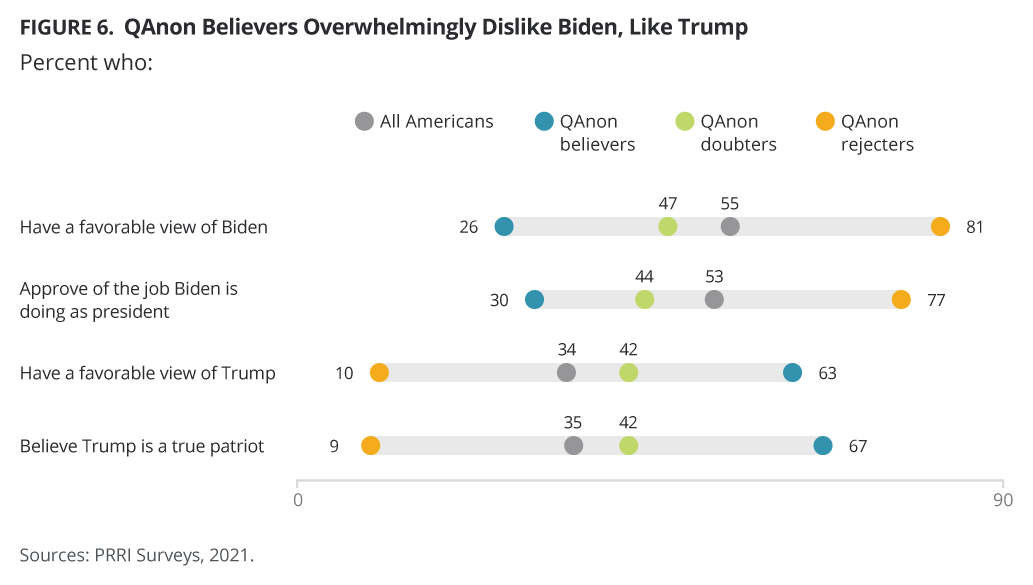
QAnon believers are much more favorable toward Donald Trump, with 63% who have a favorable opinion of Trump and 31% who have an unfavorable view of him. Around four in ten QAnon doubters have favorable views of Trump (42%), compared to just one in ten QAnon rejecters (10%). Furthermore, two-thirds of QAnon believers (67%) believe that Trump is a true patriot, compared to around four in ten doubters (42%) and around one in ten rejecters (9%).
Belief That the 2020 Election Was Stolen
Seven in ten QAnon believers agree with the statement that the 2020 election was stolen from Donald Trump (69%), including just under half (47%) who completely agree with the statement. Just over one-third of QAnon doubters (36%) and just six percent of QAnon rejecters agree.
There are some partisan breaks among QAnon believers on whether the election was stolen. Republican QAnon believers (93%) and independent QAnon believers (66%) are more likely than Democrat QAnon believers (29%) to say the election was stolen.
QAnon believers who most trust far-right news outlets universally agree that the election was stolen from Trump (99%), including more than eight in ten (86%) who completely agree. QAnon believers who most trust Fox News also overwhelmingly agree that the election was stolen (87%). QAnon believers who most trust mainstream news are much less likely to agree (50%).
Responsibility for the Insurrection on January 6, 2021
Americans say white supremacist groups (59%), former President Donald Trump (56%), and conservative media platforms that spread conspiracy theories and misinformation (55%) shoulder a lot of responsibility for the violent actions of the rioters who took over the U.S. Capitol on January 6.
QAnon believers are notably less likely than QAnon doubters and QAnon rejecters to put a lot of the blame for the Capitol riot on all these groups. QAnon believers are about half as likely as QAnon rejecters to blame white supremacist groups (36% vs. 78%), conservative media platforms that spread conspiracy theories and misinformation (36% vs. 78%), and Donald Trump (30% vs. 83%). About half of QAnon doubters blame white supremacist groups (54%), conservative media platforms (46%), or Trump (48%).
Despite the lack of any credible evidence that substantial numbers of liberal or left-wing groups participated in the insurrection, 38% of Americans put a lot of blame on these groups. Not surprisingly, this is the only group on which the majority of QAnon believers (59%) place a lot of blame for the Capitol riot, compared to 20% of QAnon rejecters and 44% of QAnon doubters.
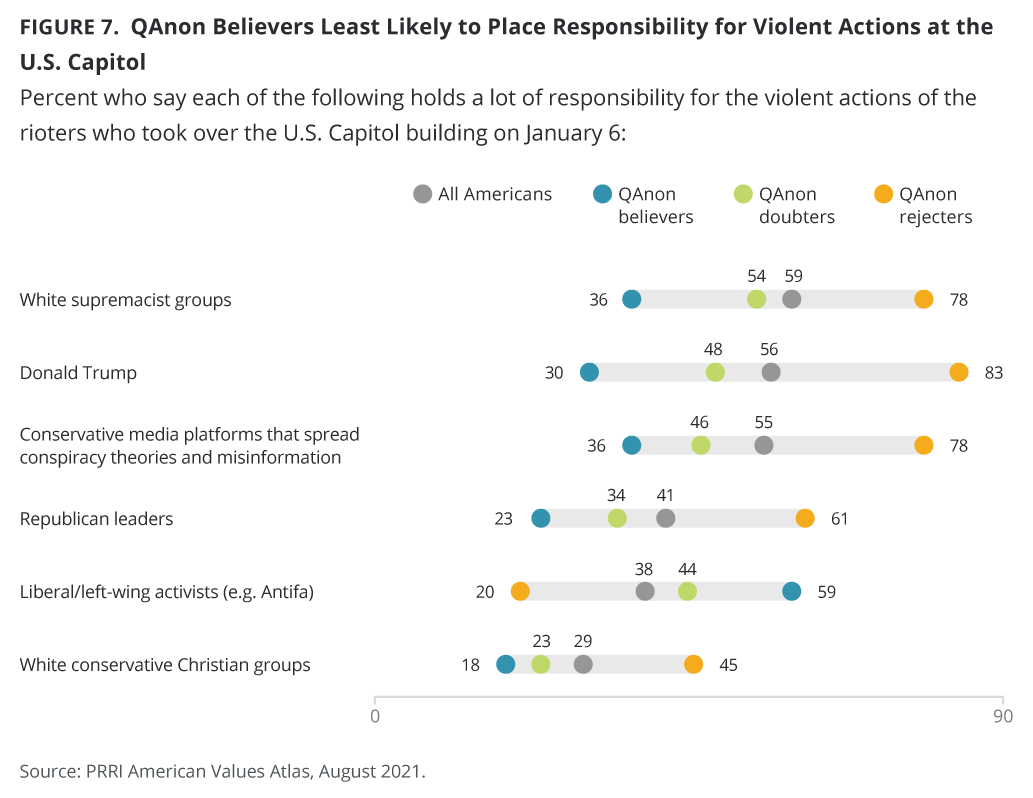
Views on Political Violence
In late 2021, about one in ten Americans (9%) agreed it might be necessary to commit an act of violence to save the country. QAnon believers (17%) and QAnon doubters (11%) are more likely than QAnon rejecters (4%) to say that it might be necessary to commit an act of violence to save the country.
QAnon believers (45%) and doubters (51%) are substantially less likely than QAnon rejecters (70%) to say that harsh and violent language in politics contributes “a lot” to violent actions in society today, and are more likely to say that harsh and violent language does not contribute at all to violent actions (QAnon believers, 17%; QAnon doubters, 11%; QAnon rejecters, 5%).
Views on Cultural Threats
Americans are divided on whether American culture and way of life have mostly changed for the better or for the worse since the 1950s (47% vs. 52%). While a majority of QAnon rejecters (63%) say that the American culture and way of life have mostly changed for the better, about a similar percentage of QAnon believers say it changed for the worse (67%).
Around eight in ten QAnon believers (81%) agree with the statement that America is in danger of losing its culture and identity, compared to significantly smaller shares of QAnon doubters (61%) and rejecters (27%). Additionally, more than seven in ten QAnon believers say that the values of Islam are at odds with American values and way of life (72%), or that the American way of life needs to be protected from foreign influence (73%). QAnon rejecters (30% and 33%, respectively) and doubters (58% and 63%, respectively) are much less likely to agree.
Around seven in ten QAnon believers agree that God has granted America a special role in human history (68%) or that “things have changed so much that I often feel like a stranger in my own country” (68%). QAnon doubters and rejecters are much less likely than believers to say that God has granted America a special role (53% and 21%, respectively), or that they feel like a stranger in their own country (45% and 23%, respectively).
QAnon believers (32%) are about twice as likely as QAnon doubters (17%) and about five times as likely as rejecters (6%) to agree with the statement that “the idea of America where most people are not white bothers me.”
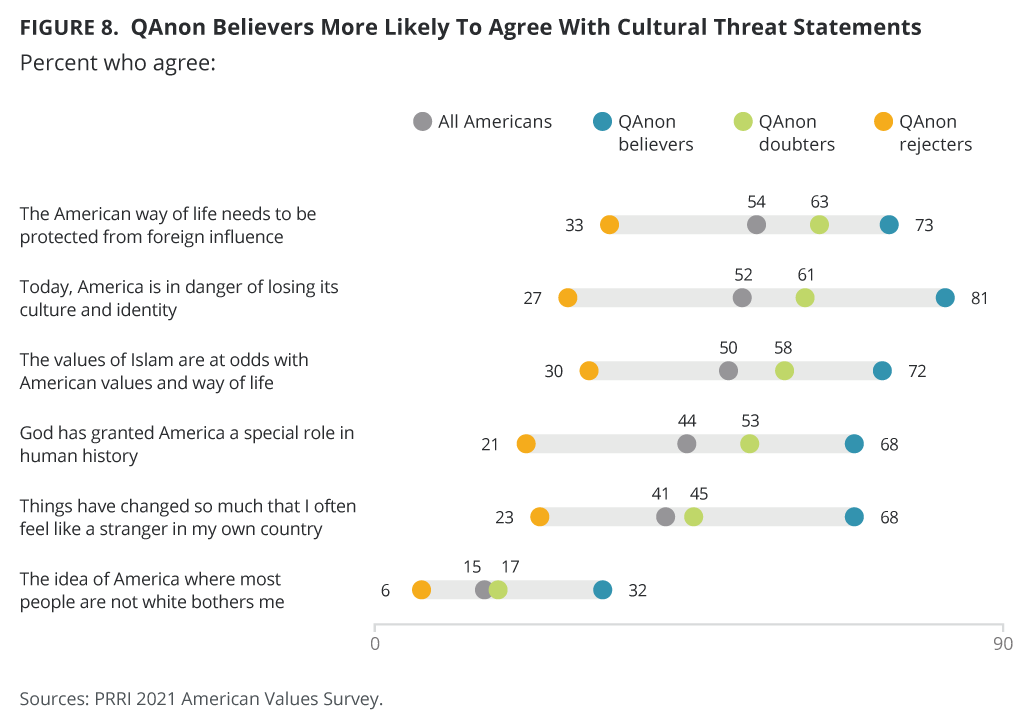
A majority of Americans (56%) say that believing in God is very or somewhat important to being truly American. QAnon believers are more than twice as likely as QAnon rejecters to say that belief in God is important (78% vs. 33%). In fact, two-thirds of QAnon believers (66%) say that being Christian is important to being truly American, compared to half of QAnon doubters (50%), 43% of all Americans, and one in five QAnon rejecters (20%). In addition, nearly seven in ten QAnon believers (69%) say that being born in America is important to being truly American, compared to 54% of QAnon doubters and 29% of QAnon rejecters.
A smaller but significant percentage of QAnon believers say Western European heritage is important to being truly American (30%) and are substantially more likely than QAnon rejecters (7%), all Americans (17%), and QAnon doubters (20%) to think this way.
Methodology Note
The full dataset used for analysis consists of 19,399 respondents from four surveys designed and conducted by PRRI throughout 2021. All surveys are among random samples of adults (ages 18 and over) living in all 50 states in the United States and who are part of Ipsos’s KnowledgePanel. Some surveys include small additional opt-in samples to increase the sample sizes in smaller states. All surveys’ full samples are weighted to be representative of the U.S. population. The margin of error for the full dataset is +/- 0.9 percentage points, including the design effect of 1.6. There are 2,776 QAnon believers in the dataset. Analysis of this subgroup has a margin of error of +/-2.4 percentage points, including the design effect.
Survey methodologies for the four individual surveys used in this report can be found in the full survey releases here:
- Religious Identities and the Race Against the Virus: Engaging Faith Communities on COVID-19 Vaccination: (Wave 1: March 2021)
- Religious Identities and the Race Against the Virus: (Wave 2: June 2021)
- Dramatic Partisan Differences On Blame for January 6 Riots
- Competing Visions of America: An Evolving Identity or a Culture Under Attack? Findings from the 2021 American Values Survey
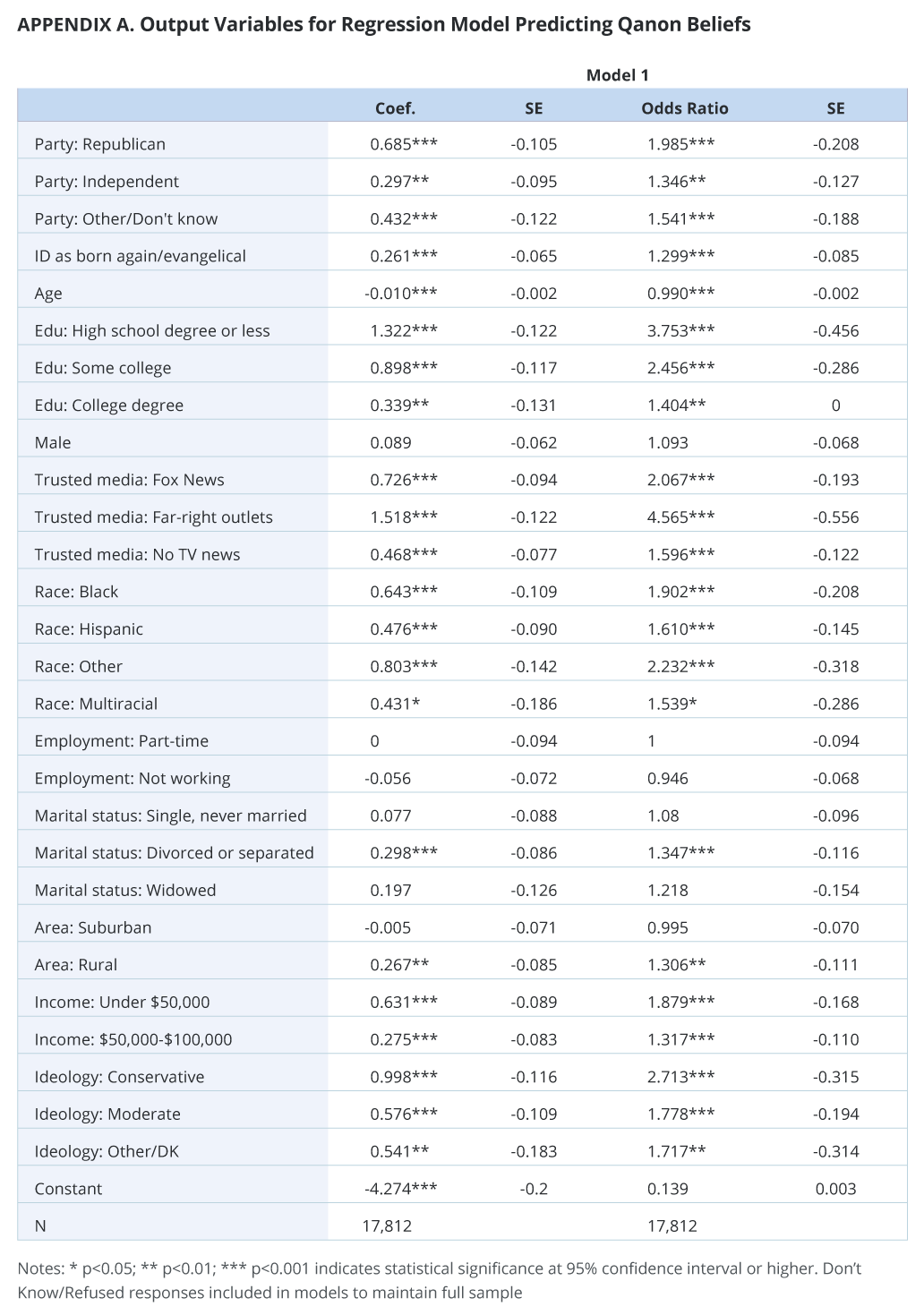
End Notes
[1] https://www.nytimes.com/article/what-is-qanon.html
[2]https://gnet-research.org/2022/01/06/qanon-and-beyond-analysing-qanon-trends-a-year-after-january-6th/
[3]Agree-disagree questions can sometimes have “acquiescence” bias, owing to people’s tendency to be agreeable in surveys. However, these specific questions are likely more robust due to their extreme content and are generally consistent with other estimates of believing in these conspiracy theories.
[4]While it is impossible to determine whether the survey is fully representative of all QAnon believers, the data for the QAnon believer subset utilizes the original survey weights that ensure the full samples are representative of the U.S. adult population.
[5] Mainstream outlets include NBC, CBS, ABC, CNN, MSNBC, local broadcast news, and public television.


